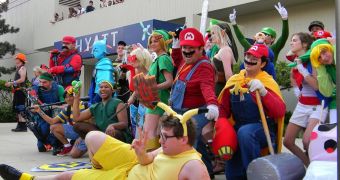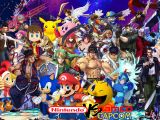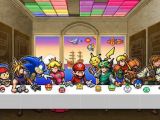I’ve never got to play Zelda or the other annoying Nintendo games, the ones spawning mascots and endless rehashes for 30 years now. I didn't play them when I was supposed to, because I was too busy pretending to be Doomguy and covering the world in railroad tracks, one square at a time, in Civilization.
By the time I did get my hands on a console, it was already too late. The games held little sway over my PC master race brain. That held true for consoles, and I still don't understand how people can play first-person shooters using a controller, and why cross-platform multiplayer isn't allowed, so mouse users can run circles around puzzled console gamers.
I remember playing Quake and Unreal Tournament, and after seeing how different Call of Duty-type multiplayer felt, and how maps got smaller and smaller, with less good vantage points, in order to ensure that you would get flanked by people running and gunning, I thought that it was just a pale imitation of the old days.
I also remember playing a sort of Mario port/clone on PC, and then Captain Comic, Hocus Pocus, Jazz Jackrabbit, and many other great platformers like Bio Menace, Duke Nukem, and Commander Keen, and thinking how pedestrian Mario felt.
I had a blast playing Prehistorik 2 and never looked twice at Super Mario World. I mean, it was nice and all, but it was quite uneventful and its successors could never hold a candle to Blizzard's Blackthorne or to Delphine's Another World.
The awe that people feel when seeing Zelda, Kirby, Mario, Samus Aran or Mega Man is lost on me. The strange popular culture fixation on just a handful of characters is a mystery to me, when there's a whole sea of worthy adventurers out there, waiting to find a home.
Part of me wants to take the easy way out and to think that it's for the same reason Kim Kardashian is more popular than Margaret Hamilton. But there's also a deeper reason for this, one that has to do with the same all-or-nothing attitude that makes me dislike Apple products.
Nintendo isn't letting any new people in
The big N is keeping all its darlings hostage on its platforms. The company has refused, time and time again, to bring its games to other computers, and it's still being very resistant during the surge of mobile gaming, when it could have capitalized on its ancient franchises and introduced them to a new generation.
Instead, a lot of today's kids have no idea what Castlevania or Metroid is. Nintendo has always played on nostalgia and benefited from a very dedicated fanbase, and a lot of people introduced their children to the games of their youth, which have been rehashed countless times since then.
The fact that Nintendo is still profitable is probably the biggest threat to its future. The company has been refractory to change and innovation, and its stubbornness has been criticized by the fanbase many times, starting with the support for indie developers and ending with the long-standing dispute regarding Nintendo's preference to region lock its hardware.
In addition to this, Nintendo's hardware sales are also dwindling. They're not plummeting, which means that the conservative Japanese corporation thinks that it's doing well to preserve the status quo.
The latest Pokemon games sold like hot cakes, and even the Wii U, which has been underperforming since it was launched back in 2012, has shown some signs of life with the release of Mario Kart 8 and Super Smash Bros. for Wii U.
This does not mean that the company is doing well, but just that it has the necessary funds to invest in its future. The Xbox One and PlayStation 4 have a few more years ahead of them, but Nintendo, outside of Japan, where its 3DS handheld is still the dominating gaming platform, is slowly losing ground.
The world will forget Nintendo ever existed
One of the main enemies of the Big N is the rise of mobile gaming, the ubiquitous presence of cute and cuddly characters to replace Nintendo's aging ones, and the fact that you don't need to carry around a dedicated device in order to get your game on.
Big consoles still have a comfortable life ahead of them, with a span of at least a few more years until they can be considered obsolete due to the sheer size of big-screen gaming and the massive inertia associated with such a big phenomenon.
Carrying around a device to game on is something done out of necessity. Back when the Game Boy came out, there was nothing that could compare to it. It was truly unique, and you had no choice but to get one if you wanted to play on the go.
Nowadays, everyone is playing all sorts of great-looking games on smartphones and on tablets, devices that can be also utilized for work or other forms of entertainment, and that serve no singular, entirely useless goal, and are far less clunky to carry around.
Nintendo has already missed a very good chance to permeate the mobile market at inception and to secure a strong position over the next decade, but it's not too late. The mobile gaming industry is already very big and it's estimated to grow by around 50 percent in the next couple of years.
Late to the party is still better than missing
That means that it's not too late. It's an industry that's dominated by a few colossal players, and Nintendo is used to that.
Now, the only thing missing is for the Japanese corporation to make the shift and secure its relevance with today's youngsters, just like it did back in the late '80s and early '90s.
People won't play Zelda indefinitely, thinking about the good old days and that one good title that they actually liked. Because Zelda is a stupid game for little kids, and there's a limit to how much you can bank riding on nostalgia alone, while your primary audience is growing up.
Nintendo won't completely disappear from the market but instead will gradually falter until there isn't anyone alive to remember how great the first Mario was. And then, the company will wonder why nobody is interested in the same game they were interested in 20 years ago, and why nobody wants to buy the dedicated hardware platforms required to play the ancient, rehashed titles.
The Nvidia Shield, GamePop, Ouya, GameStick, Mojo and many others will step up to occupy a position that Nintendo used to hold, the go-to device for playing something mindless and relaxing.
Also, let's not forget that the Steam Machines are coming. The world is changing and Nintendo is still refusing to acknowledge it.
Personally speaking, that means nothing to me. I never liked the company's games and never will, because I appreciate substance over form and popularity. I merely want to understand.

 14 DAY TRIAL //
14 DAY TRIAL // 



